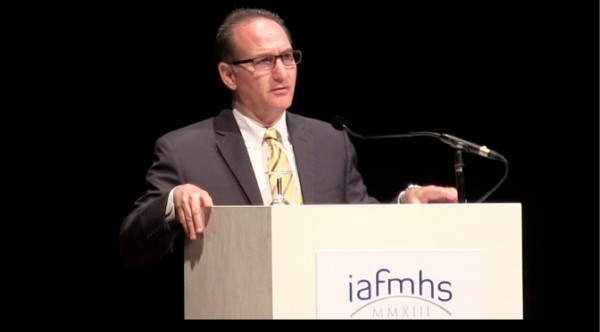Judge Steven Leifman from Miami-Dade, Florida delivers the final Keynote address of the 2013 International Association of Forensic Mental Health Services conference in Maastricht, Netherlands. This was an excellent address that speaks directly about trying to “change the system.” Judge Leifman shares his perspective on trying to lead change for large, difficult systems, such as the mental health system. The Miami-Dade County jail is the largest psychiatric facility in the state of Florida; that is, it houses more individuals with psychiatric issues than any other facility in Florida. In this address, Judge Leifman provides a staggering account of his personal experiences with this system and his thoughts about how to address this important issue.
Abstract
200 years ago, people with severe and disabling mental illnesses in the Unit- ed States were often confined under cruel and inhumane conditions in jails. During the 1800s a movement known as “Moral Treatment” emerged that sought to hospitalize and treat individuals with mental illnesses rather than simply incarcerating them. Unfortunately, overcrowding at these institutions, inadequate staff and lack of effective treatment programs resulted in facilities being able to provide little more than custodial care. Furthermore, physical and mental abuses became common and the widespread use of physical restraints such as straight jackets and chains deprived patients of their dignity and freedom. The asylums intended to be humane refuges for the suffering instead became houses of horrors.
By the mid-1900s, more than a half million people were housed in state psychiatric hospitals across the United States. The system was stretched beyond its limits and states desperately needed some alternative to addressing this costly and ever-expanding crisis. This period marked the beginning of the community mental health movement.
As more light was shed on the horrific treatment people received in state psychiatric hospitals, along with the hope offered by the availability of new and effective medications, a flurry of federal lawsuits were filed against states which ultimately resulted in the deinstitutionalization of public mental health care. Unfortunately, there was no organized or adequate network of community mental health centers to receive and absorb these newly displaced individuals.
For many individuals unable to access care in the community, the only options to receive treatment is by accessing care through the some of the most costly and inefficient points of entry into the healthcare delivery system including emergency rooms, acute crisis services, and ultimately the juvenile and criminal justice systems.
There are two ironies in this chronology that have resulted in the fundamental failure to achieve the goals of the community mental health movement and allowed history to repeat itself in costly and unnecessary ways. First, despite enormous scientific advances, treatment for severe and persistent mental illnesses was never deinstitutionalized, but rather the responsibility was transferred from state psychiatric hospitals to jails and prisons. Second, because no comprehensive and competent community mental health treatment system was ever developed, jails and prisons once again function as de facto mental health institutions for people with severe and disabling mental illnesses. In two centuries, we have come full circle, and today our jails are once again psychiatric warehouses.
The video of this keynote address is below.
This was the final keynote address of the 2013 IAFMHS Conference. The next conference will take place from June 19-22, 2014 at the Sheraton Center in Toronto, Canada. The theme of the 2014 conference is Trauma, Violence, and Recovery: Risk and Resilience Across the Lifespan.








